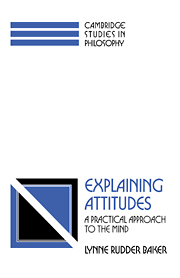7 - Mind and metaphysics
Published online by Cambridge University Press: 05 June 2012
Summary
Just as the Standard View finds its home in a particular metaphysical picture, so does Practical Realism. In Chapter 8, I sketch the larger metaphysical picture from which my account of belief is an abstraction. In this chapter, however, I want to defend Practical Realism from objections based on the metaphysics of the Standard View. The first objection is that the account of the attitudes is not “naturalistic”: It does not provide (nor does it aim to provide) nonintentional and nonsemantic conditions for having an attitude. The second objection concerns scientific psychology: It may be charged, on the one hand, that Practical Realism renders attitudes unsuitable for any theoretical role in science and, on the other hand, that, anyway, psychological research relies on (and hence indirectly confirms) the conception of beliefs as brain states. The third objection is that Practical Realism may be incompatible with materialism. The last objection is that Practical Realism is no realism at all.
NEED INTENTIONALITY BE “NATURALIZED”?
Many philosophers suppose that there is an important pretheoretical distinction between intentional and nonintentional properties. Say that a property is intentional if and only if either it is a propositional-attitude property – for example, the property of believing that such and such – or its instantiation presupposes instantiation of propositional-attitude properties. Whereas nonintentional properties, such as the property of being constituted by H2O, seem to reside safely in molecular reality, intentional properties seem to be uncertainly rooted in the physical world.
- Type
- Chapter
- Information
- Explaining AttitudesA Practical Approach to the Mind, pp. 193 - 219Publisher: Cambridge University PressPrint publication year: 1995

